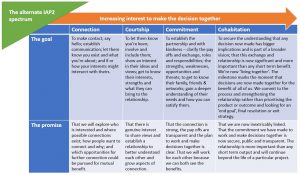Relationships and an alternative IAP2 Spectrum

Opinion piece from Paul Kooperman, Manager Communications and Engagement
Due to the broad lack of understanding from government and corporates about what it means to ‘engage with communities’ – what ‘engage’ means and how it might or could be achieved – many private companies, government agencies, Local Government Authorities and State Government Departments quite rightly utilise the IAP2 spectrum to guide their engagement practice. Many Community Engagement Practitioners also use this spectrum as a way of being consistent with their engagement across multiple consultations, using a tried and tested (and well-researched) tool designed specifically for the sector, which justifies a clear and trusted methodology for their ‘engagement’.
They ask themselves: ‘are we informing, consulting, involving, collaborating or empowering’ and to what extent? They pick one and thrust forth to tick the engagement box, often feeling dissatisfied with the outcome as it’s always questionable as to the level to which people feel part of such a process and satisfied as to the outcome.
Those who practice engagement in this way are missing the point. Who cares?! The outcome is not as relevant as practitioners sometimes believe it to be.
So, what is relevant?
The only thing that actually matters when we’re engaging or consulting anyone is the relationship between ‘us’ (the company or government agency or department) and the person or people we’re consulting. The sense of ownership over the process and outcome, the feeling like they’re part of it, they’re included and government cares and is really listening and responding.
I’d like to propose that relationships are more important than the outcome. Yes, people may want to ‘complete the jigsaw puzzle’ as a clear outcome that we can all be proud of, but how do we get there? I’d like to suggest it’s the journey and not the destination that matters. How do people feel whilst they’re completing the puzzle, what are the fears and frustrations, the moments of conflict or connection, the choices and challenges? And how is everyone coping with all of it? Did we complete the puzzle as friends? Or as distant acquaintances that will never speak again – well, until the next puzzle, until the next consultation.
What if we saw consultation or engaging our communities as a relationship spectrum, where our relationship with a community had to be stronger as our interest in making a decision together with that community increased?
Let’s say a new community hall. We want to build one. We know some of the community wants it. We could go ahead and build it, maybe even do a survey so we get some idea of what some people want, but without systematic and sustained relationship building the project is at best increasing the ambivalence of our community and at worse, heading for disaster and increased community tensions.
How much do we want to make the decision of the hall with our community? Not at all? That’s easy, let’s do a survey, build the hall and be done with it. Do we want to make the decision as friends? Let’s do what we do with all relationships, whenever we want to make friends with someone: let’s get to know them, ask their name, let’s meet and chat about it, break bread together, get to know each other’s friends a little, understand each other’s perspectives. Yes, it’s time consuming, yes, it’s laborious, so is building any relationship – it takes time and effort. Who wins from this process? We all do. We know each other, we have a relationship, we feel heard and connected.
If you’re making a bigger decision with community, you make more effort, you spend more time and resources to make the relationship work. You want to share the decision-making process or empower a group to decide something for others? You’ll need to develop a significant relationship with this group, almost like you’re ‘living together’ – you may decide some things together, and some areas you may hand over entirely for them to decide on behalf of everyone. But you’re in this for the long haul. This is not a three-month commitment. You can’t just walk away. You have to trust them. Like in any serious relationship.
I’d be open to hearing your views. Am I way off the mark here?
Look at the ‘Relationship Spectrum’ (above), see if you can apply it. I’d be keen to hear your examples and thoughts. This is the direction I think government needs to be moving in. Towards establishing and building and growing relationships for the long term. It’s hard but it’s rewarding and will provide everyone with an increased sense of inclusion and ownership over the place they live. Isn’t that worth it?
You can find Paul through LinkedIn.
Paul Kooperman
